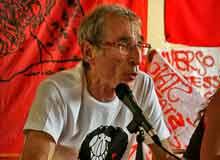
MIA > Archive > Bensaïd > Obituaries
Published on the Socialist Workers Party Website, 13 January 2010.
Downloaded with thanks from there.
Marked up by Einde O’Callaghan for the Marxists’ Internet Archive.
 |
The sad litany of deaths of Marxist intellectuals of the 1960s generation has continued. The French philosopher and activist Daniel Bensaïd – one of the great figures to emerge from the students’ and workers’ rebellion of May-June 1968 – died on 12 January at the age of 63.
Daniel was one of a small group of activists who, rebelling against the conservatism of the French Communist Party, broke with its youth organization in 1966 to form the Jeunesse Communiste Révolutionnaire (JCR). The JCR played a leading role in the student movement in 1968. It went on to form the nucleus of the Ligue Communiste Révolutionnaire (LCR), the most important force on the far left in France that a year ago launched the New Anticapitalist Party (NPA).
In his autobiography Daniel vividly described his upbringing centred on the modest bistro his parents ran in a working-class neighbourhood of Toulouse with a strongly Communist political culture. These roots perhaps help to explain his great gifts as a communicator even when he was engaging with the most esoteric philosophical concepts and themes.
The great upturn in workers’ struggles in the late 1960s and early 1970s encouraged tens of thousands of young people around the world to rally to revolutionary socialist organizations. In a book written with Henri Weber, Daniel called May 1968 ‘a great rehearsal’ for the revolution to come. He articulated his generation’s sense of urgency, of what he later called ‘revolutionary impatience’, declaring: ‘History is breathing down our necks.’
For many years after 1968 Daniel worked full-time for the LCR and for the Trotskyist international current of which it was the French section, the Fourth International. He travelled widely in Latin America and played an important role in the foundation of the Workers Party in Brazil.
This influence has continued into recent years. I remember him bringing a cheering audience of Brazilian socialists to their feet at the World Social Forum on the eve of the great antiwar protests in 2003 with a tremendous speech denouncing neoliberalism and imperialism and pointing to the new movements of resistance that were emerging.
Many of the 1960s generation abandoned revolutionary politics once their hopes of rapid change were disappointed. Not Daniel. As a philosophy lecturer at the University of Paris 8 (St Denis), he wrote a series of works devoted to developing a version of Marxism that, while unflinching in its critique of capitalism, was sensitive to the complexities and uncertainties of history.
Perhaps the most important of the astonishing range of books he wrote were the essays collected in La Discordance des temps (1995) and Marx for Our Times (first published the same year and in English in 2003). Daniel was deeply influenced by the great German Marxist critic Walter Benjamin. Benjamin viewed history as a catastrophe and revolution as a sudden, violent interruption of the normal course of events.
Though he withdrew from the central leadership of the LCR in the mid-1990s Daniel remained deeply engaged politically. He was one of the strongest advocates of the LCR’s drive outwards expressed in Olivier Besancenot’s successful campaigns in 2002 and 2007 presidential campaigns and in the launch of the NPA.
In recent years Daniel was particularly concerned to educate a new generation of activists in the Marxist tradition. He wrote a number of important essays on revolutionary strategy and the ‘new internationalism’ represented by the anticapitalist and antiwar movements. He also launched the theoretical journal ContreTemps, which is now linked to the NPA.
Daniel achieved all this while struggling with serious illness for the last 15 years of his life. It was from his hospital bed that these past months he organized a major conference on the idea of communism that will take place in Paris later this month. His physical frailty was belied by the sense he conveyed of an immensely strong will, by his rich, deep voice, and by the dry humour that informed both his personal conversation and his public speaking.
He was a tremendously eloquent speaker and writer. His comrade Pierre Rousset put it very well when he said to me once that Daniel would write around something but, through the vivid images he used, succeed in evoking it much more effectively than if he had written more directly about it.
Daniel Bensaïd’s death, like that of Chris Harman barely two months earlier, deprives revolutionary Marxism of one of its strongest and most creative voices. His influence will live on in his writings, in the records that survive of his speeches, and in how both his words and his example have helped to shape generations of militants around the world.
This does not diminish the grievous loss that his partner Sophie, his family and friends, and his comrades have suffered. Our sympathies and solidarity go out to them.
Last updated on 23 January 2010